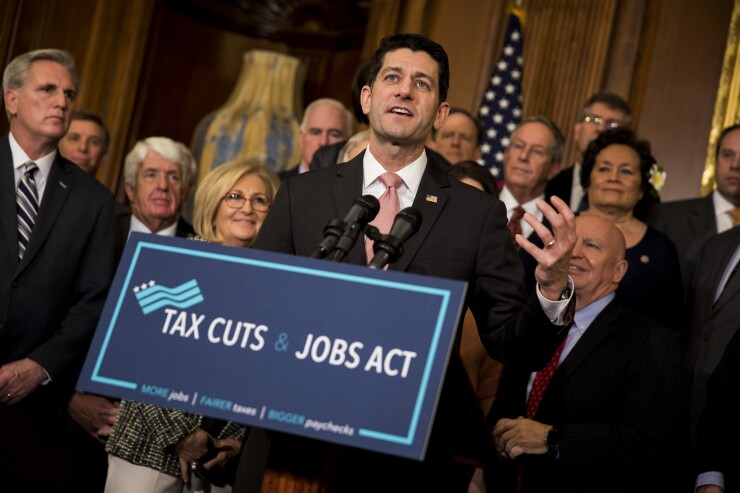Toss routine planning right out the window.
Now that the status quo of tax planning has been upended by the passage of the Tax Cuts and Jobs Act of 2017, wills, trusts and portfolios are all due for a once-over and advisors are bracing to make sense of some of the most sweeping tax changes in decades.
For one, they saw homeowners in high-tax states rushing to pre-pay 2018 property tax bills before state and local tax deductions were capped at $10,000. It is just one example of myriad of ways, often unexpected, that the new laws will change the status quo of tax planning. Whatever planners used to do routinely must be re-examined. Generalizations will prove to be dangerous.

The big Kahuna on the estate tax front is that exemptions have been doubled to about $11.2 million per person (“about” because there is uncertainty surrounding the inflation adjustment and rounding until the IRS sets the figure). For a couple, it is $22.4 million, at least until 2026, when it reverts to $5 million per person, inflation adjusted.
Many tax experts, however, suspect that Republicans went too far pushing through tax legislation with so much tilt toward the wealthy that if the political dynamics shift sufficiently in 2020, the pendulum could swing in the opposite direction.
1) Planners must be the catalyst
It’s important now to re-examine clients’ existing estate planning: wills, revocable trusts, insurance plans, and more. While many clients will assume that “Gee, the exemption for a married couple is over $22 million, I don’t need to worry about estate planning,” that would be dangerous. The biggest challenge planners will face is getting clients to understand that a large exemption does not solve estate-planning issues.
Clients might avoid discussing estate plans with their CPAs and attorneys. Foolishly, many will feel that they do not need to pay “hundreds of dollars per hour for advice I don’t need because the exemptions are so high.”

It will be left to the advisor to educate clients about the need to revisit all of their existing planning, much of which may be wrong, depending on each client’s circumstances.
2) Rework outdated wills
Planners know the drill but clients do not want to hear it. That 20-year-old, five-pager just won’t suffice. “But if there is no tax issue why do I need a complicated will?”
It will be left to the financial planner to educate clients about the need to revisit all of their existing planning, much of which may be wrong.
Estate planning was never just about taxes. Clients love simple and with the estate tax irrelevant in their minds, they will want short, simple wills. But those wills do not include flexible trusts to protect surviving spouses and children from creditors and predators. Wills do not include protections for later life and aging that a robust revocable trust does. Clients must know that real planning is needed.
3) Bad formulas
One of the most dangerous problems with old wills and revocable trusts is the formula used to fund bequests that have been twisted by the new high exemptions.
If a client signed a will or revocable trust in 2003 when the estate tax exemption was just $1 million, the funding might have worked like this: “I give the maximum amount to a credit shelter trust that won’t create an estate tax and the rest to my husband.” The credit shelter trust might have been for the benefit of children from a prior marriage, or even children and a spouse.

If the estate was $4 million, that meant $3 million outright to the husband and the rest to share (or to others). Now, the entire estate will go to those others, or to a trust to be shared with others, and nothing outright to the spouse. Even if the client’s estate was $10 million, the above pattern might have worked acceptably — the husband would have received nearly $5 million outright — until the end of 2017, but in 2018 it could be disastrous. Many people have never updated their wills as the laws have changed. The huge increase in the exemption makes it critical to evaluate how the dollars flow.
Bad formulas can appear in benefiting grandchildren as well. An old will written when the generation-skipping transfers tax exemption was $1 million might have planned to set aside that amount for grandchildren and the balance for children. “I bequeath the maximum amount that is not subject to generation-skipping transfer tax to the trust for my grandchildren. The remainder of my estate shall be divided equally among my children and distributed outright to them.” On a $5 million estate with two children, that might have meant a trust of $1 million for the grandchildren and $2 million per child. Now the children get nothing.
Congress has tinkered endlessly with the estate tax. Addressing the many what-ifs will make a client’s documents more complicated and costly, but anything less is risky.
4) A closer look at old trusts
Whatever planners used to do routinely must be re-examined. Generalizations will prove to be dangerous.
Every irrevocable trust should be reviewed. Many old life insurance trusts were intended to pay an estate tax when the exemption was $1 million. Does that plan still make sense? Clients should be guided to a more reasoned evaluation of what new purposes the old trust might now serve, or how the old plan can be modified.
A physician client might have an old insurance trust for which the spouse and children are beneficiaries. Even if that policy will no longer be needed to pay an estate tax because of the high exemptions, what if the exemptions are reduced to the $2.5 million, 2009 level proposed by the Obama administration? Unlikely, but possible.
What if the insurance policy is a good one and provides a great asset protection tool? Even if the estate tax is no longer relevant, the plan might work for other purposes. It is usually surprising how little clients remember about what old trusts provide. More than 20 states have laws that permit merging an old trust into a new trust (called “decanting”), which can facilitate updating administrative and distribution provisions to help repurpose the old trust.
4) Powers of attorney
Planners should review durable powers of attorney, as well. Many have provisions giving agents the right to make gifts. Are those relevant under current law or dangerous spigots for elder financial abuse? Many wealthy clients who should take advantage of the new high exemptions before they sunset or are legislatively changed will be uncomfortable doing so.
For them, perhaps a backstop is to recommend they have their estate-planning attorney update their powers to include a broad gift provision. That way, if they become incapacitated before the law changes unfavorably, the agent can use some of the new exemptions before they disappear.





